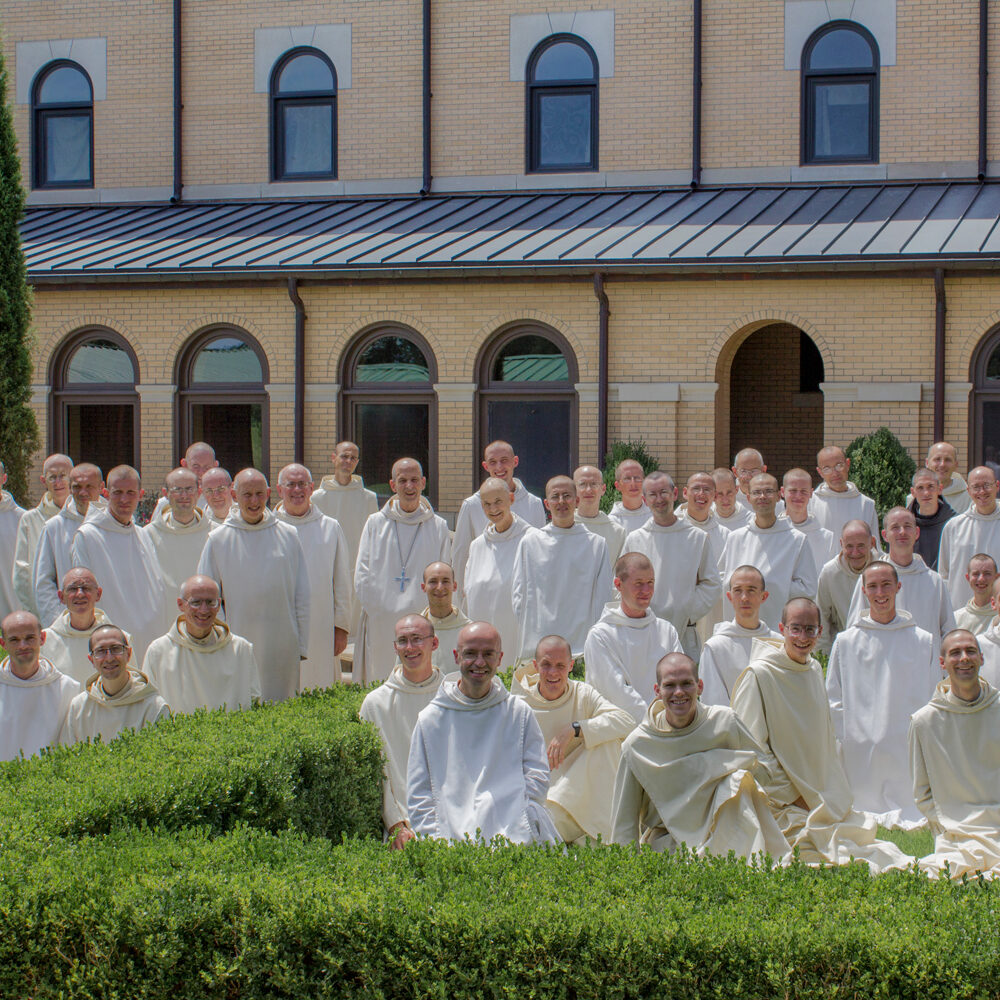Dear Brothers and Sisters in Christ,
My Very Dear Sons,
Today we celebrate the transitus of Our Blessed Father Saint Benedict, that is to say, his death, which was for him the “transit” or “transition” from mortal existence on this earth to the blessed life of Heaven. Unlike most human beings, this Saint, not only was fearless in the face of dying, but looked forward with unmistakable joy to what was to follow his experience here below. In this, he had a predecessor in the Greek philosopher, Socrates, who, although without the grace of the Christian faith, understood something of the enigma.
…[I]t seems to me natural, said the great man, that a man who has really devoted his life to philosophy should be cheerful in the face of death, and confident of finding the greatest blessing in the next world when his life is finished (Plato, Phaedo, 63e-64a).
It is striking, furthermore, how our holy Father, founder of the Western monks, this great miracle worker and authentic visionary, was often enlightened by Divine grace in relation to the death of holy persons. As his biographer tells us, three days after his last meeting with his sister Scholastica, Saint Benedict
stood in his room, looking up toward the sky, [when] he beheld his sister’s soul leaving her body and entering the heavenly court in the form of a dove. Overjoyed at her eternal glory, the text continues, he gave thanks to God in hymns of praise. (Saint Gregory the Great, Life of Saint Benedict, chapter 34)
Soon afterwards Our Blessed Father was granted a similar grace, no doubt his greatest vision, while he was keeping watch at night in his monastic cell.
Long before the night office began, explains Saint Gregory, the man of God was standing at his window, where he watched and prayed while the rest were still asleep. In the dead of night, he suddenly beheld a flood of light shining down from above more brilliant than the sun, and with it every trace of darkness cleared away. According to his own description, the whole world was gathered up before his eyes in what appeared to be a single ray of light. As he gazed at all this dazzling display, he saw the soul of Germanus, the bishop of Capua, being carried by angels up to heaven in a ball of fire. (Ibid.)
Of course, the culmination of these illuminations from God with respect to the mystery of death, came with Benedict’s own departure from this life. We turn here once more to the narrative contained in the book of Saint Gregory the Great.
In the year that was to be his last, the man of God foretold the day of his holy death to a number of his disciples…Six days before he died, he gave orders for his tomb to be opened. Almost immediately he was seized with a violent fever that rapidly wasted his remaining energy. Each day his condition grew worse until finally on the sixth day he had his disciples carry him into the chapel, where he received the Body and Blood of our Lord to gain strength for his approaching end. Then, supporting his weakened body on the arms of his brethren, he stood with his hands raised to heaven and as he prayed, breathed his last. That day, two monks, one of them at the monastery, the other some distance away, received the very same revelation. They both saw a magnificent road covered with rich carpeting and glittering with thousands of lights. From his monastery, it stretched eastward up into heaven. And there, in the brightness, stood a man of majestic appearance, who asked them, “Do you know who passed this way?” “No, they replied.” “This, he told them, “is the road taken by blessed Benedict, the Lord’s beloved, when he went to heaven.” (St. Gregory, Life, chapter 35)
In this holy season of Passiontide, we obviously look beyond the deaths of the Saints to contemplate the dying and death of the Lord Himself, God incarnate. This is the immense, the fathomless mystery. All other considerations pale in comparison. Here is the death, the most precious of all, that puts an end, in the end, to death itself, the dark penalty Saint Paul refers to as the final enemy.
For he must reign, until he hath put all his enemies under his feet. And the enemy death shall be destroyed last: For he hath put all things under his feet. (I Corinth. 15: 25-26)
For the man of the Old Testament, death was a dark and fatal thing. “Who is the man,” writes the psalmist, “that shall live, and not see death: that shall deliver his soul from the hand of Hades?” (Psalm 88:49). Or again, “For there is no one in death, that is mindful of thee: and who shall confess to thee in hell?” (Psalm 6:5). However, for Saint Benedict and all those living in the grace of the New Testament, things have changed, the tables have been turned. Thanks to the sacrifice of the Lord, there is a luminous path for the soul that leads to God in love and trust. “…Precious in the sight of the Lord is the death of his saints.” (Psalm 115:15) Closer to us in time, the little Saint of Lisieux, Therese of the Child Jesus, while suffering tremendously as her mortal life came to a close at the young age of twenty-four, penned these golden words to a priest on June 9th, “I am not dying; I am entering into life!” May we all have the incomparable grace to make our own transitus, our own passage out of this world, when the time comes, with the sober but shining joy of the Saints, leaning with the confidence of little children on the saving Passion of Our Lord and the compassionate love of Our Lady at the foot of the Cross. Amen.




